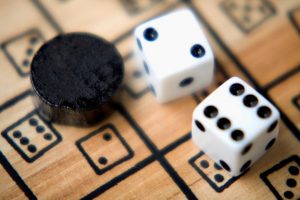‘Play’ is seen as the antithesis of what it means to be ‘grown up’. But our research found 9 out of 10 UK consumers agree its “important to have fun” and the same number believe “play time isn’t just for kids.”*
As we navigate an increasingly volatile world, we’re seeing a rise in adult play from consumers not just in the UK but across the globe, using it as a way to relieve anxiety and stress.
The formal definition of play is: “Engaging in activity for enjoyment and recreation rather than a serious or practical purpose.”
There’s a lot research on the health benefits of ‘play’, stating we need unproductive fun to live healthier lives. Surrounded by seriousness – workplace stress, economic downfall and being ‘switched on’ all the time via technology, play is no longer only for kids but crucial for adults.
We initially saw this last year, picking out ‘Let’s Play’ as one of our Happiness Trends for 2016. Now in 2017 the trend is even more ingrained in consumer culture.
Wanting to know more, we took to our Illume Network of leading edge consumers to see how the trend is playing out in three different countries. As a result, we’ve found it’s a global need but each country is acting upon it differently, depending on their cultural background and macro environment.
USA: PLAY TO REFRESH
With the USA fixated on the pursuit of happiness, fun is inevitably in top priority. The mindfulness industry in the US is booming as combatting stress and maintaining a positive mental state are all seen as ways of achieving happiness. ‘Play’ is a strand of this movement, with consumers looking to enjoy themselves as a way to do this. The increased demand to play is shown in the fact two thirds of American shoppers agree that toys aren’t just for kids, and almost one quarter of US consumers purchased a toy or game for themselves.
An example of US consumers tapping into play for self-care is ‘Camp Grounded’ – a summer camp designed for adults, where attendants can engage in typical childlike summer camp games such as arts and crafts, dancing and s’mours as well as more conventional wellness activities like yoga and meditation. Another movement crossing the US is ‘Painting with a Twist.’ Branded as ‘looking like art but feeling like fun’, adults will join their friends in a painting class where they can drink alcohol, chat, and have fun whilst getting messy with paint. Relating to US consumer culture, ‘play’ here is commercialised – something to be bought in order to enhance wellbeing and bring US consumers closer to their ultimate goal of happiness.
JAPAN: PLAY TO DE-STRESS
With Japanese working culture notorious for long hours, as many as one in five workers are at risk of death from overwork. This lack of work-life balance is encouraging Japanese consumers to blow off steam and genuinely enjoy themselves. One way Japanese consumers are relieving stress is through ‘Kawaii’ culture, which roughly means ‘cute.’ ‘Kawaii’ pervades Japanese culture – from themed cafes to cosplay, adults openly embrace these childlike cute characters as a reaction to uncertainty, turbulence and outrage in everyday life. The cuteness in these characters is seen as a way of relieving tension, anger and stress – a similar effect to watching YouTube cat videos.
Moving away from childlike play and more towards rebellious fun, brands like Harley Davidson are recognising this need to unwind with their new test drive experience. Consumers will receive a Harley Davidson bike for the weekend along with a ‘Go Live, Go Ride’ box containing a leather jacket, helmet, globes and a GoPro camera to capture the journey. The experience facilitates the need by allowing Japanese consumers to play the role of someone else for the weekend, enjoying both the thrill and freedom of a motorbike against the monotony of everyday work life, as well as the cultural pressures to remain respectful and maintain ‘face’.
UK: PLAY FOR ESCAPE AND OPTIMISM
With 9 out of 10 UK consumers agreeing its “important to have fun” and the same number believing “play time isn’t just for kids”, the demand for fun in the UK is at its peak*. In previous years we’ve seen adult ball-pools and cereal cafes, but now we’re seeing ‘play’ taking a new direction.
In 2016, the UK saw a 20% increase in popularity of table-top games. From Monopoly, to previously niche games like Dungeons & Dragons, millennials in particular are driving this trend for communal play.
With the UK looking more inwardly and the future looking gloomy post-Brexit, the table-top game allows consumers to escape reality and absorb themselves in a different world. Board game cafes are popping up across the country, helping people to come together in real-life and enjoy genuine human interaction, fun and laughter. Tapping into British culture, ‘play’ here is much more reserved and understated, linking to tradition and the reassuringly familiar feeling of a classic board game. As we progress into 2017, we predict the comfort of close family, friends and shared play will be held in importance.
A SHARED NEED
Based on the latest research in human motivation, we identified ‘Positive Emotions’ as a key driver of human behaviour. Humans actively seek out Positive Emotions in their every lives; craving the hedonic feelings of happiness, pleasure, and comfort. These emotions help us to alleviate stress, live a longer life and to have healthier social relationships.
The trend of play is facilitating this need for Positive Emotions. However, through cultural difference play is acted upon in different ways. Each country is focusing on one positive emotion as a response to their macro environment and core culture. For example, in America, play is a possession to be bought, believing one can buy fun to lead to a happier life. In Japan play is related to ‘pleasure’, to gain more pleasure in day-to-day life to counter work stresses. Finally in the UK, play is for ‘comfort’ – the comfort of play with close family and friends in a difficult world.
*Quantifying Trends, Join the Dots, October 2016




